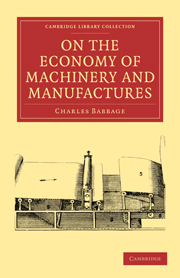Book contents
- Frontmatter
- PREFACE
- Contents
- INTRODUCTION: STATEMENT OF THE OBJECT AND PLAN OF THE WORK
- CHAPTER I SOURCES OF THE ADVANTAGES ARISING FROM MACHINERY AND MANUFACTURES
- CHAPTER II ACCUMULATING POWER
- CHAPTER III REGULATING POWER
- CHAPTER IV INCREASE AND DIMINUTION OF VELOCITY
- CHAPTER V EXTENDING TIME OF ACTION OF FORCES
- CHAPTER VI SAVING TIME IN NATURAL OPERATIONS
- CHAPTER VII EXERTING FORCES TOO GREAT FOR HUMAN POWER, AND EXECUTING OPERATIONS TOO DELICATE FOR HUMAN TOUCH
- CHAPTER VIII REGISTERING OPERATIONS
- CHAPTER IX ECONOMY OF MATERIALS EMPLOYED
- CHAPTER X OF THE IDENTITY OF THE WORK WHEN IT IS OF THE SAME KIND, AND OF ITS ACCURACY WHEN OF DIFFERENT KINDS
- CHAPTER XI OF COPYING
- CHAPTER XII ON THE METHOD OF OBSERVING MANUFACTORIES
- CHAPTER XIII ON THE DIFFERENCE BETWEEN MAKING AND MANUFACTURING
- CHAPTER XIV ON THE INFLUENCE OF VERIFICATION ON PRICE
- CHAPTER XV ON THE INFLUENCE OF DURABILITY ON PRICE
- CHAPTER XVI ON PRICE, AS MEASURED BY MONEY
- CHAPTER XVII OF RAW MATERIALS
- CHAPTER XVIII OF THE DIVISION OF LABOUR
- CHAPTER XIX ON THE DIVISION OF MENTAL LABOUR
- CHAPTER XX ON THE SEPARATE COST OF EACH PROCESS IN A MANUFACTURE
- CHAPTER XXI ON THE CAUSES AND CONSEQUENCES OF LARGE FACTORIES
- CHAPTER XXII ON THE POSITION OF GREAT FACTORIES
- CHAPTER XXIII ON OVER-MANUFACTURING
- CHAPTER XXIV INQUIRIES PREVIOUS TO COMMENCING ANY MANUFACTORY
- CHAPTER XXV ON CONTRIVING MACHINERY
- CHAPTER XXVI PROPER CIRCUMSTANCES FOR THE APPLICATION OF MACHINERY
- CHAPTER XXVII ON THE DURATION OF MACHINERY
- CHAPTER XXVIII ON COMBINATION AMONGST MASTERS OR WORKMEN AGAINST EACH OTHER
- CHAPTER XXIX ON COMBINATIONS OF MASTERS AGAINST THE PUBLIC
- CHAPTER XXX ON THE EFFECT OF TAXES AND OF LOCAL RESTRICTIONS UPON MANUFACTURES
- CHAPTER XXXI ON THE EXPORTATION OF MACHINERY
- CHAPTER XXXII ON THE FUTURE PROSPECTS OF MANUFACTURES, AS CONNECTED WITH SCIENCE
CHAPTER XXXI - ON THE EXPORTATION OF MACHINERY
Published online by Cambridge University Press: 29 August 2010
- Frontmatter
- PREFACE
- Contents
- INTRODUCTION: STATEMENT OF THE OBJECT AND PLAN OF THE WORK
- CHAPTER I SOURCES OF THE ADVANTAGES ARISING FROM MACHINERY AND MANUFACTURES
- CHAPTER II ACCUMULATING POWER
- CHAPTER III REGULATING POWER
- CHAPTER IV INCREASE AND DIMINUTION OF VELOCITY
- CHAPTER V EXTENDING TIME OF ACTION OF FORCES
- CHAPTER VI SAVING TIME IN NATURAL OPERATIONS
- CHAPTER VII EXERTING FORCES TOO GREAT FOR HUMAN POWER, AND EXECUTING OPERATIONS TOO DELICATE FOR HUMAN TOUCH
- CHAPTER VIII REGISTERING OPERATIONS
- CHAPTER IX ECONOMY OF MATERIALS EMPLOYED
- CHAPTER X OF THE IDENTITY OF THE WORK WHEN IT IS OF THE SAME KIND, AND OF ITS ACCURACY WHEN OF DIFFERENT KINDS
- CHAPTER XI OF COPYING
- CHAPTER XII ON THE METHOD OF OBSERVING MANUFACTORIES
- CHAPTER XIII ON THE DIFFERENCE BETWEEN MAKING AND MANUFACTURING
- CHAPTER XIV ON THE INFLUENCE OF VERIFICATION ON PRICE
- CHAPTER XV ON THE INFLUENCE OF DURABILITY ON PRICE
- CHAPTER XVI ON PRICE, AS MEASURED BY MONEY
- CHAPTER XVII OF RAW MATERIALS
- CHAPTER XVIII OF THE DIVISION OF LABOUR
- CHAPTER XIX ON THE DIVISION OF MENTAL LABOUR
- CHAPTER XX ON THE SEPARATE COST OF EACH PROCESS IN A MANUFACTURE
- CHAPTER XXI ON THE CAUSES AND CONSEQUENCES OF LARGE FACTORIES
- CHAPTER XXII ON THE POSITION OF GREAT FACTORIES
- CHAPTER XXIII ON OVER-MANUFACTURING
- CHAPTER XXIV INQUIRIES PREVIOUS TO COMMENCING ANY MANUFACTORY
- CHAPTER XXV ON CONTRIVING MACHINERY
- CHAPTER XXVI PROPER CIRCUMSTANCES FOR THE APPLICATION OF MACHINERY
- CHAPTER XXVII ON THE DURATION OF MACHINERY
- CHAPTER XXVIII ON COMBINATION AMONGST MASTERS OR WORKMEN AGAINST EACH OTHER
- CHAPTER XXIX ON COMBINATIONS OF MASTERS AGAINST THE PUBLIC
- CHAPTER XXX ON THE EFFECT OF TAXES AND OF LOCAL RESTRICTIONS UPON MANUFACTURES
- CHAPTER XXXI ON THE EXPORTATION OF MACHINERY
- CHAPTER XXXII ON THE FUTURE PROSPECTS OF MANUFACTURES, AS CONNECTED WITH SCIENCE
Summary
(322.) A few years only have elapsed since our workmen were not merely prohibited by act of Parliament from transporting themselves to countries in which their industry would produce for them higher wages, but it was forbidden to export the greater part of the machinery which they were employed to manufacture at home. The reason assigned for this prohibition was, the apprehension that foreigners might avail themselves of our improved machinery, and thus compete with our manufacturers. It was, in fact, a sacrifice of the interests of one class of persons, the makers of machinery, for that of another class, those who use it. Now, independently of the impolicy of interfering unnecessarily between these two classes it may be observed, that the first class, or the makers of machinery, are, as a body, far more intelligent than those who only use it; and although, at present, they are not nearly so numerous, yet, when the removal of the prohibition which cramps their ingenuity shall have had time to operate, there appears good reason to believe, that their numbers will be greatly increased; and that it may, in time, surpass that of those who use machinery.
(323.) The advocates of these prohibitions seem to rely greatly upon the possibility of preventing the knowledge of new contrivances being conveyed from one country to another; and they appear to take much too limited a view of the possible, and even probable, improvements in mechanics.
- Type
- Chapter
- Information
- On the Economy of Machinery and Manufactures , pp. 292 - 306Publisher: Cambridge University PressPrint publication year: 2010First published in: 1832



